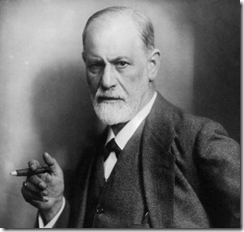or Why Sigmund Freud is right, and Scott Hanselman is wrong.
The prodigious Scott Hanselman recently wrote a blog post responding to a question posed to him – are we really developers anymore, or just good googlers? While Scott touched on a number of things in his response, including the imposter syndrome that affects many people, myself included from time-to-time, one thing he said really struck me as wrong. Wrong enough to bring me out of 4-month-long blogging hiatus. This is what Scott said:
Third, try programming for a day without Googling. Then two days, maybe a week. See how it feels. Remember that there was a time we programmed without copying our work.
While I guess trying something and reflecting on how it went can be a good course of action, it is not always the case “try cutting your wrists and sitting in a warm bath for a few minutes, a few hours. How does it feel?”. Before we head down this road of no googling lets think our strategy through a little. Are we going to start war-dialling the internet and hope that we come across something relevant? Are we going to hit the books instead? If so, are we going to read the book cover-to-cover, or look things up in the index? Isn’t looking something up in the index of a book just a horribly antiquated version of performing a very limited google search? Or are we going to ignore ‘prior art’ altogether? Imagine the following hypothetical conversation between us, and the owner of the small software consulting firm we work for:
Owner: Thanks for coming in at short notice. I’ve just gotten a call for $CLIENT you’ve been out on-site working for. I know you’ve got a great relationship with them, and you’ve done a lot of great work there, but they gave me a call earlier today, and said the standard of your work has been suffering a lot in the last two weeks. They said you’ve only delivered a fraction of what you’d both planned on. Is everything OK?
Us: OK? Everything is great! I decided two weeks ago instead of looking things up on the internet I was going to do everything from first principles. I spent most of the week writing a concurrent dictionary in C# using a lot of the data structures and concurrency theory they taught me at college. It’s been hard, and there are a few bugs, but I think in a few more weeks it will be ready to add to the project.
Owner: I see. I haven’t been too ‘hands on’ for a while, but isn’t there a ConcurrentDictionary they added in .NET Framework 4.0?
Us: You might be right.
Owner: So….just so I’m clear on this – you spent two weeks re-implementing something that was already in the .NET framework, because you unilaterally decided that building things from first principles, rather than searching for existing information on a problem was somehow “better”.
We’re all ultimately accountable to someone for how we spend our time - other founders in a start-up, team-mates and managers if we’re white-collar slaves working for “The Man”, our clients if we’re freelancers or maybe just ourselves [1]. I think wilfully ignoring all the world’s information that has been organized, and made universally accessible and useful, so you can feel better about your prowess as a programmer is crazy.
Freud, who knew a thing or two about crazy, in his 1930 “Civilization and its discontents” hit the nail on the head:
“Man has, as it were, become a kind of prosthetic God. When he puts on all his auxiliary organs he is truly magnificent; but those organs have not grown on to him and they still give him much trouble at times.”
The Internet and the google index are the magnificent auxiliary prosthetic organ that gives us programming super-powers, in much the same way that the atomic bomb is the prosthetic organ that gives humanity the god-like power to destroy the planet. All the same arguments you can make about not using google you can make about every other advancement – intellisense, syntax highlighting, IDEs, high-level languages, integrated circuits, electricity, the steam engine, mathematics, iron, agriculture, language. It is natural that the organs have not grown onto us perfectly yet, and that we, to quote Freud again “do not feel happy in his God-like character”.
[1] - A self-employed person, with no dependents, working on a project for themselves with no deadlines, which is a vanishingly small % of working programmers.
